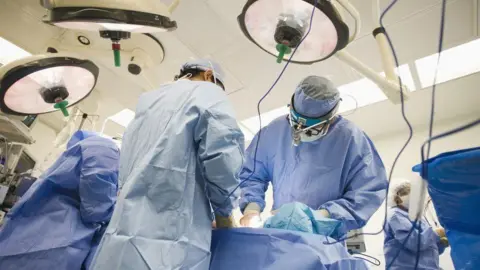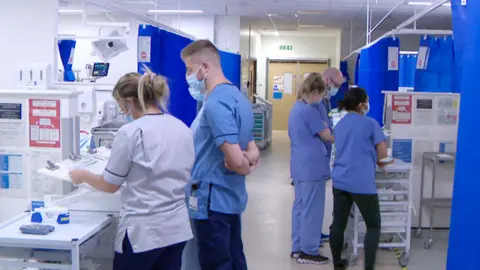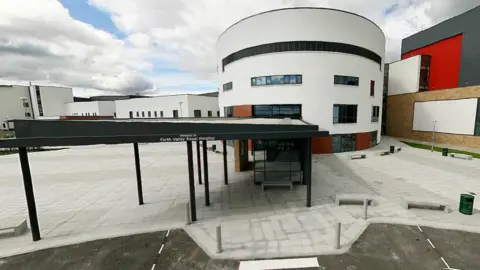Covid: Four health boards pause non-emergency surgery
 Getty Images
Getty ImagesFour Scottish health boards have now halted non-urgent procedures amid rising pressure on the NHS.
On Friday NHS Lothian stopped elective surgery due to staff shortages and rising patient demand.
Non-urgent outpatient appointments have also been cancelled to prioritise acute services.
Hours later, NHS Ayrshire and Arran also took the decision to cancel some planned procedures until the end of August.
It came just two days after NHS Borders cancelled all scheduled routine operations until the end of next week due to pressure on services.
NHS Highland stopped orthopaedic procedures earlier this week.
NHS Lothian said that increased levels of staff sickness, combined with holidays and those having to self isolate, led to a "significant reduction" in nurses and midwives in the previous two months.
This, along with "unprecedented demand" has caused longer waiting times, particularly in the emergency department.
This led to the decision to postpone procedures and allow clinic and theatre staff to be redeployed where they are most needed.
'Doing everything possible'
In a bid to ease pressure, workers have been offered more shifts, and about 460 new nurses are due to start in the next two months. Extra administration and domestic support has also been deployed.
Prof Alex McMahon, NHS Lothian's nurse director, said: "We are doing everything possible to mitigate the additional pressures we are facing, however we have to be realistic. These challenges will not disappear overnight.
"We continue to work through appointments that have already been re-scheduled in recent months and to see people who may have delayed seeking treatment because of Covid-19. This will take time.
"We also continue to be restricted in the number of people we can see each day because of the enhanced infection control measures in place. Covid is still with us."

NHS Ayrshire & Arran said it was continuing to experience significant pressures in urgent care, adding to cumulative pressures at University Hospitals Ayr and Crosshouse.
It said that, in particular, the availability of key staff to support service delivery critical care was increasingly difficult.
Medical director Dr Crawford McGuffie said: "We have taken the very difficult decision to pause some elective surgery until the end of August 2021.
"We apologise to any patients who experience a delay in their surgery as a consequence of this decision. This will be kept under constant review and we would like to provide assurance that all efforts will be made to minimise these delays."
All emergency and cancer-related activity will continue during August at both hospitals.
'Unavoidable decision'
On Wednesday, NHS Borders announced it would cancel all scheduled routine operations for the rest of the week and next week, citing pressure on services.
"There is very high demand for in-patient beds, including rising numbers of patients who are being admitted with Covid-19," the health board said.
"We fully recognise the distress caused by this unavoidable decision and are truly sorry."
On the same day, NHS Highland also announced emergency measures to cope with high demand, pausing all orthopaedic elective surgery throughout August.
The board's clinical emergency pathways had been under significant pressure and was struggling to deliver planned operations.
 NHS Forth Valley
NHS Forth ValleyKatherine Sutton, NHS Highland's chief officer for acute services, said: "We have had to act to relieve some of this pressure, both immediately and with rapid but sustainable measures to improve the situation.
"This will free up beds, allowing us to meet the demand we need for our emergency patients and by changing the space within the hospital we will be able to create additional bed capacity within medicine.
"Our response to this situation will also focus on improved staff recruitment to increase the bed numbers available within the hospital to ensure that emergency patients can be accommodated without impacting on our remobilisation of the planned elective programme which aims to deliver services to our longest waiting patients."
Doctors at Glasgow's busiest hospital, the Queen Elizabeth University Hospital, told BBC Scotland that Scotland's hospitals are under more pressure than ever.
They said that while the number of Covid patients had fallen, the NHS was trying to catch up with surgeries and treatments put on hold during the first wave of the pandemic.
More advanced disease
More people are also being admitted with other complex, more advanced disease, having put off seeking treatment. And this is leading to long waits in emergency departments and piling pressure on capacity in other parts of the hospital.
NHS Forth Valley said its acute hospital, Forth Valley Royal Hospital continued to be very busy and, like many other areas of Scotland, it had also seen an increase in A&E attendances.
The board has managed to maintain its outpatient clinics, diagnostic scans and planned operations but this was being kept under regular review in line with available capacity.
During this period of high demand, people are being encouraged to support the NHS by calling NHS 24 on 111 if they think they either need to visit a minor injury unit or visit A&E for a non life-threatening reason, so they can be directed to the right service.
In an emergency, people should dial 999 or go to their local A&E department.


